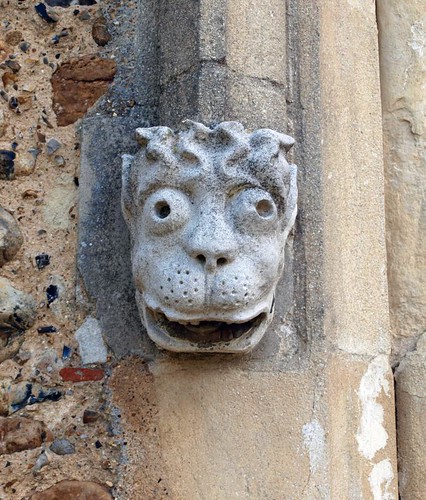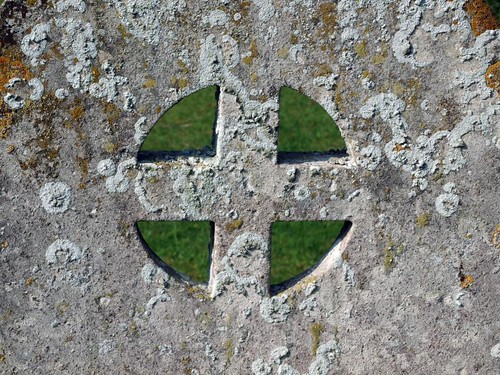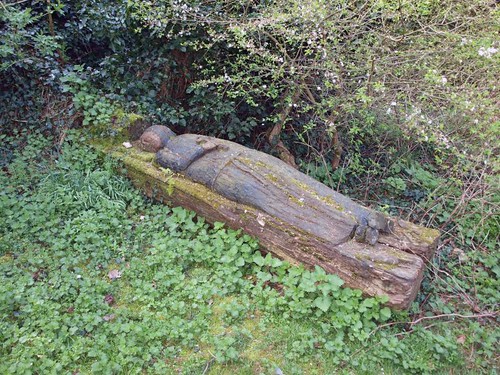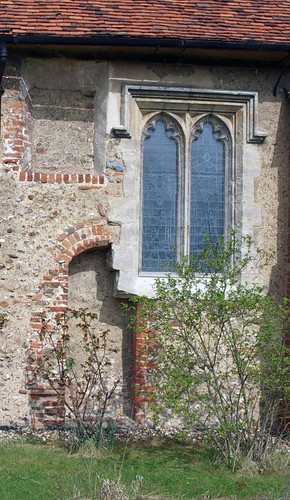Also, to be fair, I heard a report on the radio recently which said that Essex has the worst rate of church crime in the country (but whether this is because of frustrated visitors breaking in to see our churches or not was not reported).
Pevsner: ST MARY THE VIRGIN. Not in the village but until recently in the grounds of Mark Hall. These are now re-emerging as Harlow New Town, and St Mary will soon find itself the principal church and the one ancient monument of the most alive of the New Towns (cf. Harlow). The church is ancient indeed. Recent investigations have brought out a Norman window in the S wall and the arch of the Norman S doorway, both dressed with Roman bricks. Another brick doorway also discovered recently must be C16 and may have belonged to a rood-loft staircase. Late C15 N chapel of brick with two-light stone windows. C16 W tower with diagonal buttresses, a three-light W window and battlements. The N side of the church was refaced in the C18. - PAINTINGS. Scanty remains in the N chapel of a cycle of late C15 wall paintings. - MONUMENTS. Recess between chancel and N chapel. Tomb-chest with three large panels with quatrefoils and shields. On the lid brasses of Sir Peter Arderne d.1467, Chief Baron of the Exchequer, and his wife. Figures of 3ft length. Heavy canopy of three arches, the middle ones damaged. Fleuron frieze and crenellations. - Other brasses to William Harper and wife (d. c. 1490; chancel; 2ft 3in. figures), to Frances Frankelin d.1604, woman in boldly ornamented dress (chancel floor). - James Altham d. 1583 and wife. Monument with the usual kneeling figures. Children kneeling in the ‘predella’. - Sir Edward Altham d. 1632, erected 1640. Monument with flanking figures of angels. - Lady Campbell d. 1818 by G. Garrard, R.A.; no effigy; cherubs’ heads at the foot.
LATTON. A charming place, it shares a wild common with its big neighbour Harlow, but has a medieval church of its own in the park of Mark’s Hall. It has fragments of Roman Britain in its walls, bricks handled by the Saxons and the Normans and worked into this 15th century church.
Between the little chapel and the chancel the founder lies in an altar tomb, richly panelled under a carved canopy. He is Peter Arderne, and on the tomb is his brass portrait showing him in his judge’s robes, his wife beside him in a rich horned headdress. On the floor are brasses of other Ardernes, a man in armour and a woman in a veil. More magnificent is the dress of Frances Frankelin, laid to rest here in 1604. The brocaded silk, engraved in brass, is a work of art, and the brasses of her son and daughter show the lovely clothes the children wore then. There is Jacobean costume on the brasses of Emanuell and Margaret Wollaye close by. On the walls of the chancel are two monuments of another family flourishing here 300 years ago, James Altham and his wife kneeling in alabaster in front of a prayer desk, their three sons and eight daughters in a row below.
But it is the little chapel of which we may have a peep over Peter Arderne’s tomb which brings back olden times. Heads of strange beasts guard its windows outside, and inside a wagon roof curves down to coloured and gilded mouldings, under which frescoes can be traced on the walls. Over the arch of the tomb many faces remain of a Nativity scene; wings of angels appear on the splays of a very narrow peephole, and above it the sculptor has suggested the Almighty appearing in a cloud. On another wall is a painting of St Christopher at the ford. A handsome chantry chapel this must have been in the dying days of the medieval age.
A curiously roofed barn a mile away recalls that time of change. Within is all that is left of Latton Priory, lovely 14th century arches of the monastic church; yet so deserted had it become that it is on record that its last prior, John Taylor, walked out of it in 1534 and that it then fell into secular uses.
Between the little chapel and the chancel the founder lies in an altar tomb, richly panelled under a carved canopy. He is Peter Arderne, and on the tomb is his brass portrait showing him in his judge’s robes, his wife beside him in a rich horned headdress. On the floor are brasses of other Ardernes, a man in armour and a woman in a veil. More magnificent is the dress of Frances Frankelin, laid to rest here in 1604. The brocaded silk, engraved in brass, is a work of art, and the brasses of her son and daughter show the lovely clothes the children wore then. There is Jacobean costume on the brasses of Emanuell and Margaret Wollaye close by. On the walls of the chancel are two monuments of another family flourishing here 300 years ago, James Altham and his wife kneeling in alabaster in front of a prayer desk, their three sons and eight daughters in a row below.
But it is the little chapel of which we may have a peep over Peter Arderne’s tomb which brings back olden times. Heads of strange beasts guard its windows outside, and inside a wagon roof curves down to coloured and gilded mouldings, under which frescoes can be traced on the walls. Over the arch of the tomb many faces remain of a Nativity scene; wings of angels appear on the splays of a very narrow peephole, and above it the sculptor has suggested the Almighty appearing in a cloud. On another wall is a painting of St Christopher at the ford. A handsome chantry chapel this must have been in the dying days of the medieval age.
A curiously roofed barn a mile away recalls that time of change. Within is all that is left of Latton Priory, lovely 14th century arches of the monastic church; yet so deserted had it become that it is on record that its last prior, John Taylor, walked out of it in 1534 and that it then fell into secular uses.




No comments:
Post a Comment